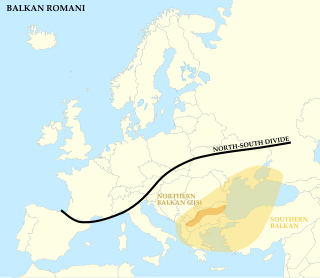| Rumelian Romani | |
|---|---|
| Native to | former Ottoman Rumelia |
| Ethnicity | Muslim Roma |
Indo-European
| |
| Language codes | |
| ISO 639-3 | – |
| Glottolog |
pasp1238 |
 | |
Rumelian Romani is a dialect of Southern Romani of strong Turkish pronunciation with Turkish and Greek loanwords, once was spoken by the Turkish- Muslim Roma ( Xoraxane) in Ottoman Rumelia, especially by the Sedentary Rumelian Romani people of various groups in Edirne in East Thrace [1] First described by Evliya Çelebi's Seyahatname in 1668, of the Muslim Roma in Gümülcine, and later by William Marsden in 1785 and by Alexandros Georgios Paspatis (Paspati), a scholar of the Romani language in 1870. [2] [3] The Greek Doctor A. G. Paspati made also the statemant in his Book, that Turks married often Roma Woman. [3] This Romani dialect is almost extinct in Turkey, but still spoken by Muslim Roma in Western Thrace today. [4]
References
- ^ "Rumelian Sedentary: Dialect Sampler, Romani Dialects Interactive - ROMANI Project Manchester". romani.humanities.manchester.ac.uk. Retrieved 2022-01-06.
- ^ Friedman, Victor A.; Dankoff, Robert (1991). "The Earliest Text in Balkan (Rumelian) Romani: A Passage from Evliya Çelebi's Seyahat nameh" (PDF). Journal of the Gypsy Lore Society. Fifth Series. 1 (1): 1–20.
- ^ a b Paspati, A. G.; Hamlin, C. (1860). "Memoir on the Language of the Gypsies, as Now Used in the Turkish Empire". Journal of the American Oriental Society. 7: 143–270. doi: 10.2307/592158. JSTOR 592158.
- ^ Adamou, Evangelia; Arvaniti, Amalia (2014). "Greek Thrace Xoraxane Romane". Journal of the International Phonetic Association. 44 (2): 223–231. doi: 10.1017/S0025100313000376. ISSN 0025-1003. S2CID 143602944.
| Rumelian Romani | |
|---|---|
| Native to | former Ottoman Rumelia |
| Ethnicity | Muslim Roma |
Indo-European
| |
| Language codes | |
| ISO 639-3 | – |
| Glottolog |
pasp1238 |
 | |
Rumelian Romani is a dialect of Southern Romani of strong Turkish pronunciation with Turkish and Greek loanwords, once was spoken by the Turkish- Muslim Roma ( Xoraxane) in Ottoman Rumelia, especially by the Sedentary Rumelian Romani people of various groups in Edirne in East Thrace [1] First described by Evliya Çelebi's Seyahatname in 1668, of the Muslim Roma in Gümülcine, and later by William Marsden in 1785 and by Alexandros Georgios Paspatis (Paspati), a scholar of the Romani language in 1870. [2] [3] The Greek Doctor A. G. Paspati made also the statemant in his Book, that Turks married often Roma Woman. [3] This Romani dialect is almost extinct in Turkey, but still spoken by Muslim Roma in Western Thrace today. [4]
References
- ^ "Rumelian Sedentary: Dialect Sampler, Romani Dialects Interactive - ROMANI Project Manchester". romani.humanities.manchester.ac.uk. Retrieved 2022-01-06.
- ^ Friedman, Victor A.; Dankoff, Robert (1991). "The Earliest Text in Balkan (Rumelian) Romani: A Passage from Evliya Çelebi's Seyahat nameh" (PDF). Journal of the Gypsy Lore Society. Fifth Series. 1 (1): 1–20.
- ^ a b Paspati, A. G.; Hamlin, C. (1860). "Memoir on the Language of the Gypsies, as Now Used in the Turkish Empire". Journal of the American Oriental Society. 7: 143–270. doi: 10.2307/592158. JSTOR 592158.
- ^ Adamou, Evangelia; Arvaniti, Amalia (2014). "Greek Thrace Xoraxane Romane". Journal of the International Phonetic Association. 44 (2): 223–231. doi: 10.1017/S0025100313000376. ISSN 0025-1003. S2CID 143602944.